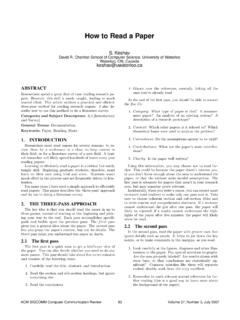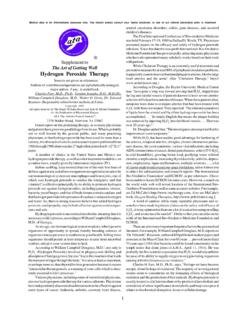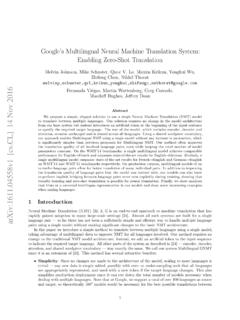Transcription of Job crafting and cultivating positive meaning and identity ...
1 (c) Emerald Group PublishingJOB crafting ANDCULTIVATING positive MEANINGAND identity IN WORKAmy Wrzesniewski, Nicholas LoBuglio,Jane E. Dutton and Justin M. BergINTRODUCTIONThe design of a job is deeply consequential for employees psychologicalexperiences at work. Jobs are collections of tasks and relationships that aregrouped together and assigned to an individual (Ilgen & Hollenbeck, 1992),and scholars have long been interested in the way these elements cometogether to constitute the experience of a job (Griffin, 1987; Hackman &Oldham, 1980). Research in this area has traditionally built on a coreassumption that managers design jobs in a top-down fashion for employees,which places employees in the relatively passive role of being the recipientsof the jobs they recently, job crafting has emerged as a theoretical approach thatexpands perspectives on job design to include proactive changes thatemployees make to their own jobs (Wrzesniewski & Dutton, 2001). Jobcrafting is defined as the physical and cognitive changes individuals makein the task or relational boundaries of their work (Wrzesniewski & Dutton,2001, p.)
2 179). By altering task and relational boundaries, employees canchange the social and task components of their jobs and experience differentAdvances in positive Organizational Psychology, Volume 1, 281 302 Copyrightr2013 by Emerald Group Publishing LimitedAll rights of reproduction in any form reservedISSN: 2046-410X/ (2013)0000001015281(c) Emerald Group Publishingkinds of meaning of the work and themselves. From the most routine tothe most complex jobs, and from the lowest to the highest tiers ofan organization (Berg, Wrzesniewski, & Dutton, 2010), we argue thatemployees have some degree of latitude in how they craft their jobs. Thus,the potential for job crafting to alter the ways in which employees define themeaning of their work and their work identities is relevant across a broadrange of job situations. Further, others have found that job crafting haspositive effects on employees degree of psychological well-being (Berg,Grant, & Johnson, 2010) and work engagement and performance (Tims,Bakker, & Derks, 2012), suggesting that job crafting matters for a numberof key individual and organizational crafting offers two important contributions to positive organizationalpsychology.
3 First, the process of job crafting puts the proactive, agenticbehaviors of employees center-stage, conceptualizing and empiricallyexploring the creative and motivational bases of employees altering theirjobs to improve their experience of work. Second, job crafting adds to ourunderstanding of positive organizational psychology through its focus onthe range of generative outcomes of job crafting including the experienceof positive meaning and sense of self, engagement, commitment, turnover,and performance. As the field of positive organizational psychology seeks tobetter understand employees optimal functioning at work, job craftinghelps to illuminate the job-related actions that employees engage in to movethemselves toward more optimal purpose of this chapter is to briefly review the job crafting literatureto date and to open up new theoretical opportunities for understanding howjob crafting can help employees cultivate a positive sense of meaning andidentity in their work.
4 WhileWrzesniewski and Dutton (2001)theorized thatjob crafting often has important implications for employees sense ofmeaning and identity in their work, the original job crafting theory does notspecify that job crafting is necessarily positive or negative for employees sense of meaning or identity . As a result, we have little theory to explain themechanisms through which job crafting is likely to cultivate a morepositivesense of meaning and identity for employees on the job. Thus, in thischapter, we elaborate job crafting theory to guide future research on thelinks between job crafting and the cultivation of positive meaning andidentity in work over time. In other words, this chapter reviews the old and introduces some new all with an appreciation of the importance ofjob crafting to the blossoming domain of positive organizational psychology(Donaldson & Ko, 2010) and positive organizational scholarship (Cameron,Dutton, & Quinn, 2003; Cameron & Spreitzer, 2012) more WRZESNIEWSKI ET (c) Emerald Group PublishingJOB crafting IN BRIEFJob crafting involves creating or initiating change to the job, as opposed toreacting or responding to change in the job (Grant & Ashford, 2008; Griffin,Neal, & Parker, 2007).
5 In essence, job crafting is the process of employeesproactively changing the boundaries that comprise their jobs. Boundarieshave been defined as mental fences (Zerubavel, 1991, p. 2) that people useto order and define limits around physical, temporal, emotional, cognitive,and/or relational entities (Ashforth, Kreiner, & Fugate, 2000, p. 474;Lamont & Molnar, 2002). Job crafters shape the boundaries that definetheir jobs in three main ways. First, job crafters may change the physical ortemporal boundaries around the bundle of tasks that they consider to betheir job. We refer to this as task crafting , and it consists of adding ordropping tasks, adjusting the time or effort spent on various tasks, andredesigning aspects of tasks ( , a teacher who spends time learning newclassroom technology to fulfill his passion for IT). Second, job crafters mayredefine the relational boundaries that define the interpersonal interactionsinvolved in performing their jobs. We refer to this as relational crafting , and it consists of creating and/or sustaining relationships with others atwork, spending more time with preferred individuals, and reducing orcompletely avoiding contact with others ( , a marketing analyst forming arelationship with someone in sales to better understand the impact of hiswork on salespeople).
6 Third, job crafters may reframe the cognitiveboundaries that ascribe meaning or purpose to the tasks and relationshipsthat comprise their jobs. We refer to this as cognitive crafting , and itconsists of employees efforts to perceive and interpret their tasks,relationships, or job as a whole in ways that change the significance oftheir work ( , a custodian who thinks of his job as enabling education byproviding clean, distraction-free classrooms for students).The three types of job crafting are not mutually exclusive, and job craftersmay exercise any combination of the three. For example, in joining a newsocial media group at a financial services firm, an employee may add taskslike planning learning events for members, thus altering relationships bymeeting and collaborating with new colleagues, and begin to see her jobdifferently because it allows her to pursue her passion for social different types of crafting may occur quickly (Petrou, Demerouti,Peeters, & Schaufeli, 2012) or unfold gradually over long periods of following example provides a more in-depth look at the form andeffects of job crafting on the work of an employee, which we refer tothroughout the crafting and cultivating positive meaning and identity in Work283(c) Emerald Group PublishingDiane is an internal audit manager at a large manufacturing joined the company 15 years ago, she now oversees a group of 30 Certified Public Accountants (CPAs) that conduct periodic audits of theorganization s functions.
7 While Diane is no longer poring over the businessrecords herself, she decides when and where many of the audits areconducted. She monitors the progress of her teams and intervenes when theymeet resistance from managers in other divisions. A lifelong fan of mysteryand crime novels, it was the detective nature of audit work that drew Dianeto the field when she was an undergraduate. She spent many years travellingthe world, visiting the company s production plants, and investigating thelarge asset purchases that showed up on the bottom line back atheadquarters. However, Diane can easily recall an important turning pointin her career. When the accounting firm Arthur Andersen was indicted in2002 for its handling of the audits at Enron, she was horrified by thefinancial losses incurred by thousands of innocent employees. Since thattime, Diane has considered her division the most important protector of thecompany s future. Internal audit is an important mechanism for uncoveringimproprieties, and for acting as a deterrent to anyone who might considerengaging in them.
8 Whether accidental or not, she has no intention of lettingthe actions of a few employees cause harm to the rest of the company. Thiscognitive crafting has fundamentally altered Diane s experience of her work identity , while still encompassing the detective role, has bro-adened to include the role of defender of the people in the organization. Shefeels connected to her coworkers, even those she has never met, and hasinfused her work with a positive meaning it did not have Diane started at the company, she was one of only two women inthe audit division. Shortly after earning her CPA, Diane joined the localdivision of the National Society of Accountants in her city, and for the pastsix years has been leading its outreach efforts. Several times each month, shespeaks at schools, ranging from middle school math to community collegebusiness classes. Sharing her personal stories and the opportunities she seesin accounting, Diane s goal is to get young people, especially young women,interested in the field.
9 Over the years she has convinced her supervisors tosee the visits not just as something meaningful for her, but as a way to buildthe firm s community reputation. By adding these tasks and relationships toher job, Diane has crafted her work to fulfill her desire to inspire the nextgeneration of accountants. She feels a connection to the future of theprofession, and through these changes to the task, relational, and cognitiveboundaries of her job, her work and her identity as an accountant andorganization member have taken on new WRZESNIEWSKI ET (c) Emerald Group PublishingWe provide the example of Diane to illustrate some of the many waysjob crafters change the boundaries of their jobs and to describe the natureof the impact of job crafting on the employee and possibly on others. Inthe next section, we move from examples to data to consider what jobcrafting researchers have found in studies of this behavior in a range OF JOB crafting RESEARCHF ollowing the introduction of the job crafting model in 2001, empiricalresearch has examined its prevalence and role in employees work lives andits impact on organizations in which job crafting happens.
10 Most of thisresearch has focused on how job crafting transforms employees perfor-mance and experience of their work. While very little of this work hasdirectly considered the impact of job crafting on work meaning and identity ,we highlight where we believe the research implications for meaning andidentity are important and empirical job crafting research to date has focused on itsrelationship with individual job attitudes and performance. For example,in the first empirical study of job crafting ,Ghitulescu (2006)surveyedengineers on autonomous teams in a manufacturing organization andspecial education teachers in a number of schools. She developed a jobcrafting scale and found that job crafting enhances individual jobsatisfaction and commitment levels, while increasing individual performanceand decreasing absenteeism (Ghitulescu, 2006). In a study of outsidesalespeople for a large consumer products company,Lyons (2008)foundthat over three-quarters of the salespeople engaged in some form of jobcrafting, which was in turn positively correlated with quality of self-image,perceived control, and readiness to change.






